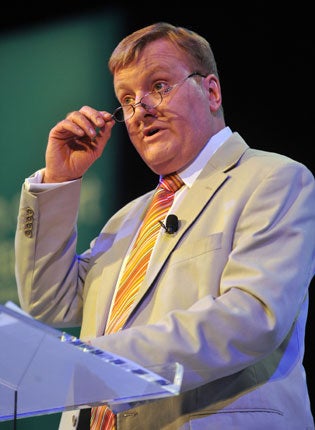Lib Dems back Clegg in coalition deal with Tories

Your support helps us to tell the story
From reproductive rights to climate change to Big Tech, The Independent is on the ground when the story is developing. Whether it's investigating the financials of Elon Musk's pro-Trump PAC or producing our latest documentary, 'The A Word', which shines a light on the American women fighting for reproductive rights, we know how important it is to parse out the facts from the messaging.
At such a critical moment in US history, we need reporters on the ground. Your donation allows us to keep sending journalists to speak to both sides of the story.
The Independent is trusted by Americans across the entire political spectrum. And unlike many other quality news outlets, we choose not to lock Americans out of our reporting and analysis with paywalls. We believe quality journalism should be available to everyone, paid for by those who can afford it.
Your support makes all the difference.The Liberal Democrats swallowed their doubts about about joining a coalition with the Conservatives last night as David Cameron hinted that their "progressive alliance" could last beyond the next general election.
A special conference of about 2,000 Liberal Democrat activists in Birmingham overwhelmingly backed Nick Clegg's decision to enter the "Liberal Conservative" coalition. Liberal Democrat sources claimed that no more than a dozen delegates opposed the deal in a show of hands.
Mr Clegg, the Deputy Prime Minister, told the meeting: "Changes the Liberal Democrats have spent months, years, campaigning for, are happening. Promises we were making to people on their doorsteps just a few weeks ago are becoming realities."
He acknowledged that "the stakes are high, for me personally, as well as the party". But he added: "I came into politics to change things, and that means taking risks. Real, big change never comes easy. So it would simply be wrong for us to let this chance of real change pass us by."
After the private meeting, Mr Clegg admitted: "A lot of people had questions. A lot of people had concerns about the future.That's, of course, in the nature of this. This is a very new thing we are doing. We are breaking the rules of the old politics. We are doing something new ... But I am immensely comforted by the fact that the overwhelming majority of Liberal Democrat members here agreed that it was the right thing to do, and above all that it was the right thing to do for this country."
Doubts surfaced before the conference when Charles Kennedy, the former Liberal Democrat leader who favoured a deal with Labour, admitted he had abstained rather than voted in favour of the Lib-Con coalition at a meeting of the party's MPs last week. Outside the Birmingham conference, Eddie Hartley the former chairman of Worcester Liberal Democrats, tore up his membership card. He has joined the Greens in protest at Liberal Democrat concessions to the Tories on Trident, proportional representation and nuclear power. "I think the party is going to tear itself into two factions," he said.
Yesterday Mr Cameron promised that Mr Clegg would be part of his "inner core" in a government he described as a "progressive alliance", a phrase used by Gordon Brown when he appealed for the votes of Liberal Democrat supporters during the election campaign. Branding himself as a " Liberal Conservative", Mr Cameron said he hoped "political cabinet" sessions without civil servants would include both Tory and Liberal Democrat ministers meeting together rather than separately. He said Mr Clegg would chair some cabinet committees.
Asked on the BBC's Andrew Marr Show whether the agreement with the Liberal Democrats could last beyond the next election, he replied: "Well let's, let's get through the first five years first. I actually believe this can last for five years. It can be a strong and stable government. And it's very much in line with some of the things I've been saying over a five-year period where I've said we need to have progressive ends and we use Conservative and yes Liberal Democrat means to achieve those progressive ends, and I think we're already setting out how that can be done."
The tensions rumbling inside the Conservative Party surfaced when Eurosceptic MPs revived their calls for a referendum on the EU's Treaty of Lisbon, a move opposed by the Liberal Democrats. Tory Europhobes hope to use a glitch over ratifying the Treaty to force a Commons vote on a referendum. The Foreign Office confirmed that legislation will be needed to ratify a technical amendment to the Treaty rebalancing the numbers of MEPs from each member-state in line with last year's EU agreement.
Ministers will resist calls for a referendum, a policy dropped by Mr Cameron after the Treaty was approv-ed by all 27 EU member states. The FO said: "This is a technical change, relating to numbers of MEPs and would not transfer any power to the EU."
Join our commenting forum
Join thought-provoking conversations, follow other Independent readers and see their replies
Comments